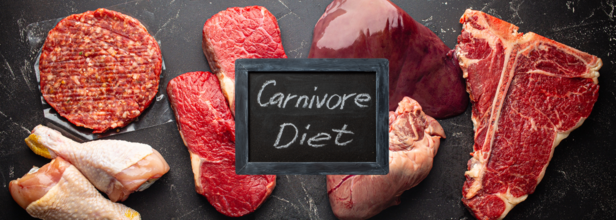
Credits: Canva
Should You Go On An All-Meat Diet?
A carnivore-diet is a kind of diet that only focuses on non-vegetarian and meat- heavy diet. For those in the US, the popular choices include beef, chicken, pork, lamb, fish, organ meats, eggs, and small amounts of hard cheese or heavy cream. Some also allow low-carb seasonings, like salt and pepper, but discourage plant-based beverages like coffee or tea.
If one has to know the history or historical association of this diet, then it could take them back to the paleolithic times. However, it is important to note that this diet is based on the "belief" that humans evolved to eat mostly meat and that carbohydrates are responsible for chronic health issues. However, studies do suggest it was not until the ice age, when vegetation was covered with snow that the earliest human began to hunt and consume meat. This suggests evidence of fire too, which was found way later, suggesting that the earliest humans probably survived on a vegetarian diet and meat substituted only in the time of crisis.
Unlike other low-carb diets like keto or paleo, which limit carbs, the carnivore diet eliminates them completely.
Are there any benefits of an all-meat diet?
While there are certain short-term benefits, there are no controlled studies that support the supposed health benefits of this diet. Claims often rely on anecdotal evidence, which lacks scientific reliability.
Some benefits suggest towards a weight loss and improved blood sugar levels, primarily due to its high protein and fat content. Protein helps increase satiety, reducing calorie intake, and may also boost metabolism.
Eliminating high-carb, processed foods like sugary snacks and refined grains can also contribute to better health markers, such as reduced belly fat and lower blood pressure. However, this could be gained even while going on at an all-meat diet, if processed meat is being confused.
Experts also suggest that many of these benefits can be achieved through less restrictive diets, such as balanced low-carb or ketogenic plans, which are easier to sustain and provide more nutrients.
Are there any risks?
Nutritional Deficiencies
The diet excludes essential plant-based foods that are rich in fiber, vitamins, and antioxidants. Without these, you miss out on nutrients like vitamin C, folate, and beneficial plant compounds that support long-term health. Fiber, for example, promotes gut health and regular bowel movements, both of which are absent in the carnivore diet.
High in Saturated Fat and Sodium
Consuming large amounts of animal products can lead to excessive intake of saturated fat, cholesterol, and sodium. While recent studies challenge the direct link between saturated fat and heart disease, high levels of these nutrients may still increase risks for heart-related conditions, especially in certain individuals.
Processed meats, such as bacon, are also high in sodium, which can elevate blood pressure and strain kidney health.
Gut Health Concerns
The lack of fiber in the diet can negatively impact gut health, potentially leading to inflammation, constipation, and an imbalance of gut bacteria. Poor gut health has been linked to several chronic conditions, including colon cancer.
Limited Suitability
The carnivore diet may not be safe for everyone. People with kidney disease, children, pregnant or breastfeeding women, and individuals with cholesterol sensitivity or a history of eating disorders should avoid this diet.

Credit: Canva
Does Ghee Coffee Really Work? Experts Answer
Ghee coffee, also known as bulletproof coffee, has gained popularity as a trendy health drink, particularly for people trying to lose weight. This unique health drink combines coffee with ghee and sometimes coconut oil or MCT oil. The trend caught traction earlier this year, with celebrities like Rakul Preet Singh, Bhumi Pednekar, and Jacqueline Fernandez promoting it on their social media pages.
Does Ghee Coffee Really Work?
Ghee coffee offers numerous benefits, including sustained energy, improved mental focus, and enhanced weight loss. Ghee is rich in healthy fats and when added to coffee, it provides a slow-burning source of energy, helping to maintain stable blood sugar levels and prevent energy crashes.
- Sustained Energy: Ghee coffee provides a slow-burning source of energy, helping to keep you energized throughout the day.
- Improved Mental Focus: The combination of coffee and ghee may enhance mental clarity and focus.
- Enhanced Weight Loss: Ghee is rich in healthy fats that can support weight loss efforts by promoting satiety and fat metabolism.
- Rich in Healthy Fats: Ghee contains butyrate, a fatty acid that supports gut health and reduces inflammation.
- Stable Blood Sugar Levels: The fats in ghee help maintain stable blood sugar levels, preventing energy crashes.
However, experts caution that while ghee coffee can be part of a balanced diet, it may not be suitable for everyone. The high-fat content makes it calorie-dense, which could lead to weight gain if consumed in excess. Additionally, those with dairy sensitivities should avoid ghee. As with any health trend, it's essential to consider individual dietary needs and consult with a healthcare professional before making it a regular part of your routine.
Here’s What Experts Say
In their verdict on this popular health drink, experts have asserted that it should be consumed in moderation. Dr. Thiagarajan Srinivasan, Liver Transplant Specialist at MGM Healthcare, asserted that the consumption of ghee is good for health but only when it is of limited quantity. He advised people not to follow celebrity trends and discredited them as "pseudo-science."

Image Credit: Canva
Is Yerba Mate Nature's Answer To Ozempic? Risks And Benefits
Dubbed as "Nature's Ozempic" by TikTok enthusiasts, yerba mate, a traditional South American tea, has captured interest for potentially stimulating metabolism, suppressing appetite, and aiding in weight loss. With more and more scientific evidence tying it to metabolic effects, one can't help but question whether it has the potential to outdo Ozempic, the well-loved GLP-1 receptor agonist drug used for managing weight and type 2 diabetes. But first, before it's time to switch, there is a great need to dig into the positives and negatives about this herbal beverage.
Yerba mate is a herbal tea prepared from the leaves of Ilex paraguariensis, a South American native plant found in countries such as Argentina, Brazil, Paraguay, and Uruguay. Brewed traditionally in a mate gourd and drunk through a metal straw, yerba mate has an earthy, slightly bitter flavor. It has been used for centuries for its stimulating properties and health benefits, especially its contribution to weight loss and metabolic function.
Yerba Mate vs Ozempic
Part of the reason yerba mate has drawn comparisons to Ozempic is because of its impact on appetite and metabolism. Studies indicate that yerba mate can spur weight loss by raising levels of GLP-1, a hormone that controls blood sugar and appetite. One study discovered that active ingredients in yerba mate, especially dihydroferulic acid, act on gut bacteria to activate GLP-1 production, emulating some of the effects of Ozempic.
Furthermore, a 2015 study showed that yerba mate enhances lipid metabolism, which reduces cholesterol levels and controls gene expression associated with obesity. Another study in 2021 validated that yerba mate inhibits fat accumulation, suppresses appetite, and boosts metabolism, rendering it a viable weight management tool.
Can Yerba Mate Replace Ozempic?
Although yerba mate and Ozempic have some similarities, they are not the same. Ozempic is a prescription medication that has been thoroughly tested in clinical trials and has FDA approval for type 2 diabetes and weight loss. Yerba mate is a natural supplement that does not have regulatory approval as a medical treatment.
Unlike Ozempic, in which the drug is prescribed at certain strengths, yerba mate is of varying concentrations and strengths. Although it can aid in weight loss and metabolic health, it must be viewed as an adjunct therapy and not in place of prescription medication.
Health Benefits of Yerba Mate
Aside from weight control, yerba mate has several health benefits:
1. Increases Energy and Concentration
Yerba mate has caffeine, theobromine, and theophylline that give a smooth, jitter-free energy without crash. These constituents increase mental alertness and maintain energy levels without the crash as in coffee.
2. Supports Heart Health
Research indicates that yerba mate lowers LDL cholesterol and blood pressure, which prevents heart disease. Its high antioxidant content also enhances cardiovascular function through combating oxidative stress.
3. Aids Digestion
Yerba mate supports a healthy gut microflora, enhances digestion, and alleviates bloating. Its bioactive ingredients enhance the absorption of nutrients and general health of the gut.
4. Improves Physical Performance
Some athletes take yerba mate to enhance endurance and decrease muscle exhaustion. It enhances oxygen consumption and delays lactic acid accumulation, enhancing recovery.
5. Rich in Antioxidants and Nutrients
Yerba mate is filled with polyphenols, chlorogenic acid, and vitamins including B-complex, magnesium, potassium, and zinc. They aid in immune function, fight inflammation, and enhance overall health.
Possible Side Effects of Yerba Mate
Although yerba mate has numerous advantages, consuming too much may have dangers:
1. Increased Cancer Risk
Research shows that consumption of more than a liter of yerba mate per day, especially at high temperatures, can be associated with an increased risk of esophageal and other cancers. The risk is increased among smokers and alcohol drinkers.
2. Caffeine-Related Side Effects
Yerba mate has caffeine, which can lead to restlessness, insomnia, stomach upset, and increased heart rate, particularly in sensitive individuals to stimulants.
3. Possible Drug Interactions
As yerba mate lowers blood sugar, taking it along with drugs like Ozempic can heighten the risk of hypoglycemia (low blood sugar), resulting in symptoms such as fatigue, dizziness, and sweating.
4. Risks of Nutrient Deficiency
Since yerba mate is appetite-suppressing, high use might result in poor nutrient consumption. Those using it to lose weight need to make sure that they are keeping their diet well-balanced.
Should You Include Yerba Mate in Your Daily Routine?
Yerba mate is becoming increasingly popular worldwide as a natural method of increasing metabolism, aiding weight loss, and improving energy. While it has been dubbed "nature's Ozempic," it must not be regarded as an immediate substitute for prescribed weight-loss drugs.
Yerba mate is a strong herbal drink with possible metabolic advantages, but the comparison to Ozempic must be approached cautiously. Although it can aid in weight loss, enhance heart health, and supply prolonged energy, it is no more a supplement to treat obesity or diabetes. With ongoing research, yerba mate remains a compelling option to consider for those who want a natural solution for whole body wellness. Although attracted to its antioxidant profile or supplement to suppress appetite, this South American superfood is well worth investigating—especially with responsible consumption.

Credits: Canva
Why Do The Japanese Drink Vinegar Before Their Meals?
Every culture has a particular thing that they do, a ritual that they ensure to practice throughout. It could be any ritual, an eating ritual, a drinking ritual, which becomes a habit. Most of the time they have benefits, but are unknown to people as they never question it. There is one such drinking ritual that the Japanese people follow. It is the habit of drinking vinegar before every meal.
But, why does this happen?
The Japanese people have made it a habit to drink vinegar as a health tonic. Not only do they use it as a cooking ingredient, but also as a tonic right before they sit down to consume meal. They believe that it can help them with everything in their body, including their glowing skin to digestion.
Let us find out if there is any truth to this?
Experts believe that drinking vinegar, especially if consumed before meals is a practice which can be seen in many cultures, and Japan is one of them. It has many health benefits.
Vinegar contain acetic acid that helps in increasing the production of digestive enzymes and stomach acid. This can also help break down food more effectively. There are studies too that show that acetic acid can improve insulin sensitivity and reduce blood sugar spikes that happens right after you consume your meal.
There are other benefits to drinking vinegar. It also helps to boost your metabolism and promote weight loss. Research also suggests that acetic acid can increase fat burning and reduce fat storage.
Experts also believe that vinegar can improve heart health. How does it do this? It can lower blood pressure, cholesterol levels and triglycerides.
How Much Vinegar Do The Japanese Drink?
On an average, a Japanese person drinks 15 to 30 ml, which is around 1 to 2 tablespoons of vinegar. They dilute it in water right before the meal.
What Do The Studies Say?
The US Department of Agriculture states that vinegars contain a substance called mother which has strands of proteins, enzymes, and friendly bacteria. These are mostly found in organic, unfiltered apple cider vinegar. They have a murky appearance.
As per the National Library of Medicine's research paper, titled Antimicrobial activity of apple cider vinegar against Escherichia coli, Staphylococcus aureus and Candida albicans; downregulating cytokine and microbial protein expression, vinegar can also help kill pathogens, including strains of bacteria.
People have also traditionally used vinegar for cleaning and disinfecting, treating nail fungus, lice, warts, and ear infections.
In fact, Hippocrates, the father of modern medicine, used vinegar to clean wounds more than 2,000 years ago.
A 2021 study Antibacterial apple cider vinegar eradicates methicillin resistant Staphylococcus aureus and resistant Escherichia coli, also reveals that vinegar can be used as a great food preservative, as it inhibits bacteria like E.coli from spoiling food. This is why in Japanese cuisine, vinegar is also used as cooking ingredient.
As per a 2019 clinical trial, titled The effect of apple vinegar consumption on glycemic indices, blood pressure, oxidative stress, and homocysteine in patients with type 2 diabetes and dyslipidemia: A randomized controlled clinical trial, vinegar consumption could have beneficial effects on the glycemic index and oxidative stress in individuals with diabetes and dyslipidemia. This could help lower blood sugar levels and manage diabetes.
© 2024 Bennett, Coleman & Company Limited

